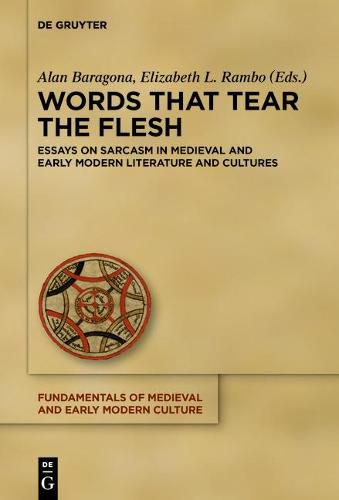Readings Newsletter
Become a Readings Member to make your shopping experience even easier.
Sign in or sign up for free!
You’re not far away from qualifying for FREE standard shipping within Australia
You’ve qualified for FREE standard shipping within Australia
The cart is loading…






This title is printed to order. This book may have been self-published. If so, we cannot guarantee the quality of the content. In the main most books will have gone through the editing process however some may not. We therefore suggest that you be aware of this before ordering this book. If in doubt check either the author or publisher’s details as we are unable to accept any returns unless they are faulty. Please contact us if you have any questions.
The rhetorical trope of irony is well-trod territory, with books and essays devoted to its use by a wide range of medieval and Renaissance writers, from the Beowulf-poet and Chaucer to Boccaccio and Shakespeare; however, the use of sarcasm, the flesh tearing form of irony, in the same literature has seldom been studied at length or in depth. Sarcasm is notoriously difficult to pick out in a written text, since it relies so much on tone of voice and context. This is the first book-length study of medieval and Renaissance sarcasm. Its fourteen essays treat instances in a range of genres, both sacred and secular, and of cultures from Anglo-Saxon to Arabic, where the combination of circumstance and word choice makes it absolutely clear that the speaker, whether a character or a narrator, is being sarcastic. Essays address, among other things, the clues writers give that sarcasm is at work, how it conforms to or deviates from contemporary rhetorical theories, what role it plays in building character or theme, and how sarcasm conforms to the Christian milieu of medieval Europe, and beyond to medieval Arabic literature. The collection thus illuminates a half-hidden but surprisingly common early literary technique for modern readers.
$9.00 standard shipping within Australia
FREE standard shipping within Australia for orders over $100.00
Express & International shipping calculated at checkout
This title is printed to order. This book may have been self-published. If so, we cannot guarantee the quality of the content. In the main most books will have gone through the editing process however some may not. We therefore suggest that you be aware of this before ordering this book. If in doubt check either the author or publisher’s details as we are unable to accept any returns unless they are faulty. Please contact us if you have any questions.
The rhetorical trope of irony is well-trod territory, with books and essays devoted to its use by a wide range of medieval and Renaissance writers, from the Beowulf-poet and Chaucer to Boccaccio and Shakespeare; however, the use of sarcasm, the flesh tearing form of irony, in the same literature has seldom been studied at length or in depth. Sarcasm is notoriously difficult to pick out in a written text, since it relies so much on tone of voice and context. This is the first book-length study of medieval and Renaissance sarcasm. Its fourteen essays treat instances in a range of genres, both sacred and secular, and of cultures from Anglo-Saxon to Arabic, where the combination of circumstance and word choice makes it absolutely clear that the speaker, whether a character or a narrator, is being sarcastic. Essays address, among other things, the clues writers give that sarcasm is at work, how it conforms to or deviates from contemporary rhetorical theories, what role it plays in building character or theme, and how sarcasm conforms to the Christian milieu of medieval Europe, and beyond to medieval Arabic literature. The collection thus illuminates a half-hidden but surprisingly common early literary technique for modern readers.